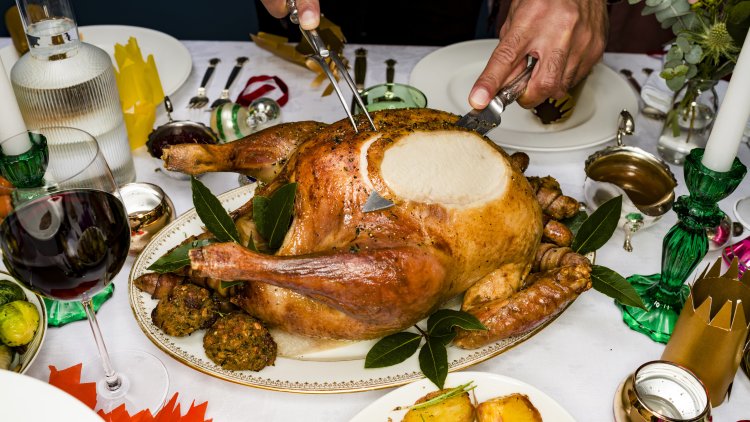Thanksgiving Recipes Keep Getting More Outlandish
Trying something new is exciting, but there’s also a financial incentive behind the need to churn out unfamiliar dishes.

This is an edition of The Atlantic Daily, a newsletter that guides you through the biggest stories of the day, helps you discover new ideas, and recommends the best in culture. Sign up for it here.
Sometimes, at a party or on the internet, you will encounter someone who is unimpressed by human ingenuity. The pace of technological progress has stalled, they’ll say. Our art is getting dumber. We aren’t as creative as we used to be.
I suggest those people Google the phrase twist on Thanksgiving, because if they do, they will be met with thousands or possibly millions of examples of our species’ boundless capacity for invention. The Pioneer Woman recommends covering your turkey in a lattice of bacon, like a pie. Food & Wine recently published a list of 25 turkey alternatives, including timpano, salmon Wellington, and something called a “Greens-and-Cheese-Stuffed Cinderella Pumpkin.” Just now, as I was writing this newsletter, The New York Times emailed me about a cornbread-chorizo stuffing topped with esquites. As a culture, we simply cannot stop trying to chop and screw Thanksgiving.
Even The Atlantic, a publication not necessarily known for its cooking coverage, has joined in on the project of perennial reinvention. Over the years, we have published Thanksgiving recipes for cornbread and mustard-greens pudding and for baked tomatoes stuffed with creamed spinach. We’ve suggested serving ricotta gnocchi and wild mushrooms, roasting pears with fresh vanilla bean instead of making cranberry sauce, starting the meal with mushroom French onion soup, and adding black-pepper marinated beef brisket to the table “for a variety.”
“The overused phrase ‘new traditions’ is all too apt,” Sally Schneider wrote in a 2009 article that argued for replacing mashed potatoes with “unexpected purees” made from Tunisian-spiced winter squash, celery root and apple, or fennel seed and chestnut. The next year, this magazine published an article by the chef Regina Charboneau that was headlined “Reinventing Thanksgiving: Traditional Foods, Fresh Recipes.” (This mostly involved, in Charboneau’s words, “jazzing up squash.”) Five days later, we ran a column by an American living in Italy who tried to adapt the holiday’s food to suit her “husband’s Tuscan palate”; the menu included various crostini to start, mashed-up persimmons served with ricotta cream in a shot glass for dessert, and for the main course, Tuscan turkey with cornbread stuffing:
I bought a turkey breast and sliced away, making a large, not-too-neat one-inch-thick scallop. I piled plenty of stuffing in the middle, then wrapped the turkey around it and stitched loose ends together (I’m not good at sewing) to make what looked like a roast, then wrapped the whole thing in caul fat (subbing for turkey skin, adding a porky element, always a good idea). The result, when sliced, was a strip of moist turkey that surrounded the stuffing. It was a big hit.
I believe it. Trying something new—especially when it involves bread enveloped in meat—is exciting, and expanding Thanksgiving’s remit to include ingredients and preparations drawn from traditions beyond the WASPy New England canon is an undeniably good thing. For the individual home cook, reinventing Thanksgiving is a chance to impress guests you rarely see, or maybe just a way to entertain yourself amid the tedium of preparing a big meal. But for cooking media, there’s a financial incentive: Every year, food publications devote their November issues to our most cooking-centric holiday, and every year, they tell us to do something different. Magazines need to sell copies (or, more recently, persuade people to click their links), and We Did the Exact Same Thing This Year is not a particularly compelling headline. Just as U.S. News & World Report needs to find a way, each year, to slightly reorder its college rankings, food magazines need to find a way to make Thanksgiving—a holiday with roots more than a century older than this country—feel new.
Any of us would be lucky to eat one of the recipes I’ve mentioned here, even the bacon thing. But we’d also probably be just fine with old flavors and un-jazzed squashes. And yet, we reinvent. Myself very much included: Just this week, I argued for moving Thanksgiving to October—and I was completely right.
Related:
Explore all of our newsletters here.
When you buy a book using a link in this newsletter, we receive a commission. Thank you for supporting The Atlantic.
What's Your Reaction?




















